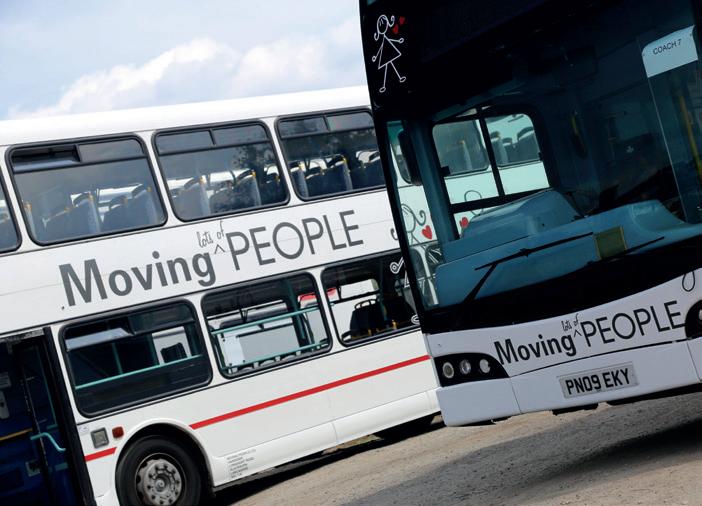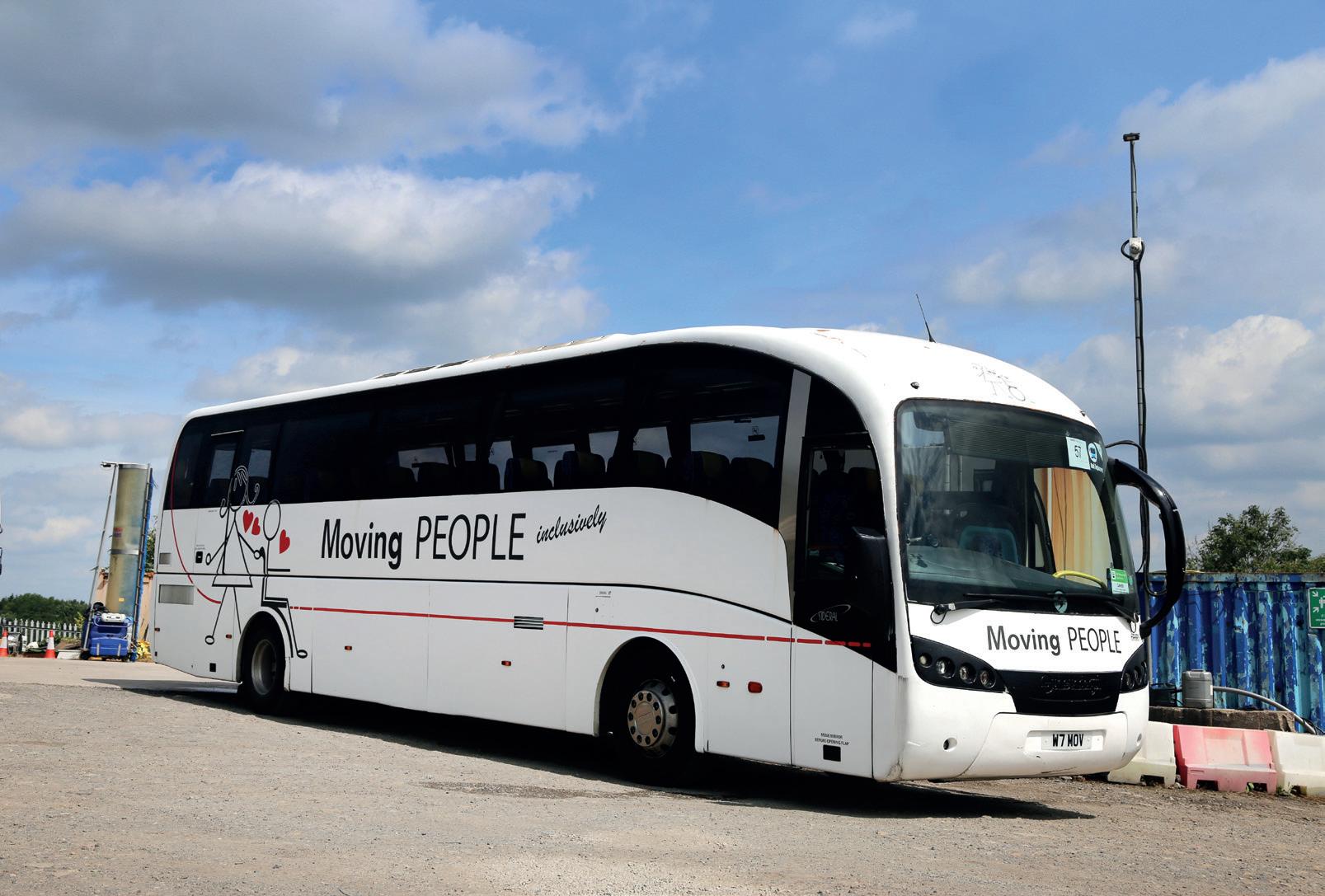
































































































































Jonathan Welch speaks to Lancashire operator Moving People about its recent award of DVSA Earned Recognition status
It’s a name that, quite literally, says what it does on the tin, to borrow an old cliché. Moving People moves people. The company, based in Oswaldtwistle (a proper Lancashire name if ever there was one) recently gained DVSA Earned Recognition status through a strong commitment to compliance and safety, an achievement of which Managing Director Glen Chamberlain and his team are rightly proud.
And one of the first things Glen did after welcoming me to the company’s depot (and offering me tea) was introduce me to Engineering Director Joe who happened to pass by, emphasising that Joe, and his colleagues throughout the business, are the real stars of the show. “It’s not about me. It’s about the men and women who make up Moving People,” he emphasised as we sat down for a chat. “Joe works really hard for us, he’s a big part of our daily operations. He has a great




People-movers. Moving People operates a varied fleet and carries out everything from school services to holidays.




knowledge of our vehicles, and can also go out and drive if we need him to.”
And driving can mean a wide range of work for the company’s drivers. The East Lancashire company offers a range of transport services, including carrying as many as 4,000 pupils per day on schools and swimming baths work, alongside private hire, day trips and holidays. “The variety in our income stream is massive,” Glen explained. “That stands us in good stead, and especially during the pandemic.”
The company is owned by Stuart and Margaret Coates. Stuart first entered the coach industry as an area manager with now-defunct rail replacement specialist Fraser Eagle, where he was responsible for planning transport for pre-planned rail closures, and handling emergencies. In 2007, he took the opportunity to buy a coach of his own, with the intention of only having one, but ended up expanding, growing to a fleet of over 30 vehicles of

all types. It was whilst working for Fraser Eagle that Stuart met Glen, who was the company’s workshop manager working under Fleet Engineer Steve Collinson. Glen took care to explain that the company was not born out of the death of Fraser Eagle, and owes a lot of its success the experience both he and Stuart gained whilst working there. “Steve took me on as a young lad and set me going in the right direction,” he explained. “The bar was set high for both the business and

It’s not about me. It’s about the men and women who make up Moving People...”

from a personal perspective.”
Glen also introduced depot manager Steve Stokes, another former Fraser Eagle employee, who is responsible for making sure the depot is run smoothly and that vehicles and washed and fuelled, and Head of Operations Ken Savage, who joined the company after a spell at First Travel Solutions following the closure of Fraser Eagle. “He’s been a big part of our journey to Earned Recognition,” Glen added.
Another key member of the team is Jane, who works in the office and, as Glen put it, ‘really stepped up’ into the role after the company’s previous tour manager left, and who works alongside Colette and Michelle in the office. Together, they keep the tours and holidays and marketing side of the business ticking over nicely.
“All of our people are critical to our business,” said Glen, giving rise to the idea that the firm’s name can be read in one of two ways: that it moves people, or that it is a team of people who specialise in moving passengers. “They represent the best of our business culture.”
That culture has led the firm down the route of gaining Earned Recognition (ER) status. “I think that road started 25 years ago when I was working for Steve Collinson,” Glen explained. “He instilled the value of what was right and wrong into me, to do things how they should be done, and to follow the right process. I’ve carried that through and brought the mantra here when I started in 2013.

“I think it was Henry Ford that said quality is about getting it right when no one is looking. We had some help for ER from Gary Young at Transultant but fundamentally we haven’t needed to change how we operate. We just needed to streamline some processes. Our audit showed up very few maintenance issues, and for tachograph compliance we moved to TruTac 12 months ago which transformed the way we deal with that.
“The TruTac app is great for drivers and can help reassure them if they’re worried about infringements. If there are any infringements, it also means we can deal with it much more quickly. We can even do it over the phone in certain circumstances and send a document via the app for the driver to review and sign. That makes our audit trail much better too.
“We strongly believe that baseline standards across the industry are too low. Earned Recognition should be the bare
minimum. I worry that if the DVSA really started looking into tachographs, it would be unbelievable what they would uncover. There are some great operators out there who do everything right but it’s hard to see the benefit – there’s no commercial reason; schools and local authorities don’t know what Earned Recognition is. It’s crazy that even government bodies don’t know about another Government scheme.
“Operators who have demonstrated transparency through ER deserve the recognition. To comply correctly costs money in staff, IT, time and not taking that tempting extra job that might be legally dubious. There should be an allowance for Earned Recognition operators when it comes to tenders for things like school contracts, otherwise it’s of limited value.
“The compelling reason for us was that we wanted to get it right. We’re fastidious and we can demonstrate that. I put a value on the fact that I can lay my head on

The company has found itself working from its ‘temporary’ home for far longer than anticipated.






amount of reassurance to local authorities. It’s not just that we’ve been audited. We’re continuously being audited. Our experience doing work for National Express and First Travel Solutions, which both require audits, has probably helped us a lot when it comes to dealing with ER. Regular audits are a good health check for us.”




my pillow at night and know we’ve done our job properly. It doesn’t mean we’re perfect, no one is, but we do our best.
“The ER team at DVSA have been a great help. We had one potential infringement that was flagged up recently by our tachograph analysis, but we couldn’t see it. We sent them the data, and they looked and couldn’t find one either. We’ve always found them helpful and willing to work with us. If you work with them, they work with you. We’ve nothing to hide, and there’s nowhere to hide.
“Moving forwards, we’d like to see a big push on explaining ER to schools and education authorities. Not long ago, after






we were called out to assist when another operator’s coach broke down, I took a double-decker myself to rescue them and got speaking to the trip organiser. They hadn’t a clue about Earned Recognition or what to ask for. They weren’t naive, they just didn’t know. They have a policy book, but it’s very basic on what to ask for when arranging transport.
“Another point that’s often misunderstood is that if an operator is on the council’s framework as a service provider, that means that they are approved and good to go. Often, it’s little more than a self-declaration. Being an Earned Recognition member is something that should give an incredible
The first step to Earned Recognition, Glen explained, was further digitisation, meaning that as well as TruTac software, the company now uses a full suite of Distinctive Systems products including its Coach Manager and Tour Booking System software as well as VMS. “It’s a really good company,” enthused Glen. “The move from the dark ages of paper-based maintenance to the Vehicle Management System has been fantastic. Our biggest challenge has been digitising drivers’ walk-around checks.
“Our drivers are the face of our business – I hate the phrase ‘just a driver.’ Lots of them are of an older generation though, so the tech might not have come so easily to all of them. Some took a bit of convincing, but once they realised there was something in it for them, they got on board with what we were doing. They now all use the app on their phones for their checks.”
Speaking about the overall pathway to Earned Recognition, Glen again came back to his opening point. “It’s not about what I’ve achieved,” he said. “It’s what


we’ve achieved. You have to take people with you. If they’re not, you won’t be compliant or profitable.”
Speaking about the wider business, Glen was keen to point out that although he might have overall responsibility, he also acknowledges that his staff have the skills to do their respective roles, and often know more about their area of expertise. “I can drive a coach,” he said as an example, “but our top-line tour drivers are the ones who are experts in it, and can handle any job, anywhere with ease.
“They have years of experience, and have built up lots of tiny bits of knowledge; where to stop, where to go at ports, the best service stations and so on. They’re experts in what they do.
“Good drivers should be paid more,” Glen continued, “but the industry won’t support that. We give them the keys to a £300,000 coach and ask them to carry 59 people, keep them safe, stay legal, make them happy and carry on smiling. It’s quite an ask, and I have complete admiration for them.”
The business today employs around 50 staff, of whom between 25 and 30 are drivers. With around 40 school services per day, it operates a fleet of 34 vehicles, although currently has an authorisation for 38. “We’d have more if we could find enough suitable drivers,” lamented Glen.
The company is happy to train new drivers if it can find them, Glen explained, telling the story of Tanvir who started as a



minibus driver during the pandemic. The company put him through his PSV test, and he’s now capable of driving anything anywhere – except abroad, as he hasn’t renewed his passport!”
It’s clear that there’s a huge admiration for the firm’s drivers, but it’s more than skin deep; Glen and the team in the office make sure the drivers have what they need to do the job. He continued: “I’m really proud of our drivers. They’re not prima donnas, they’ll drive anything, from a top line coach to our 20 year old spare bus on schools work. I understand why some only want to drive coaches, and we don’t have a problem with that idea, but this isn’t the place for them! We need people who will still do the job properly, whatever they’re driving.
“We also find that the ‘same vehicle, same job, same driver’ mentality can lead to some selectivity when reporting defects. It can be beneficial, but familiarity breeds contempt, and also, different eyes can sometimes see if something is wrong. We do make sure we have really comprehensive driver information packs for all our regular work, so everyone can feel comfortable on all our jobs. And if they have a question, they can always ask us in the office.”
The information packs were indeed comprehensive and well put together, a sign that those in the back office actually care and pay attention to what’s going on ‘out of sight, out of mind’ front of house, out on the streets. The ones Glen showed me contained clear route information along with maps of the route and common diversions, for example to avoid steep hills during snow. The packs are also available as PDFs and can be sent to drivers via the Coach Manager software if there’s a change to their duty during the day.
“It’s one of those small things that all add up to create the whole,” Glen said.
Glen’s office is housed in one of a number of temporary buildings on the site, which itself was only intended to be a stop-gap location but which the company has occupied for far longer than originally expected whilst plans are completed for a more fitting facility elsewhere. On his desk, I noticed the remains of a sheared turbocharger, which turned out to be from a Volvo Olympian. “It’s a reminder,” Glen explained, “that I’m not having a hard


day. It had a hard day.”
Speaking of Olympians reminds me to ask about the fleet. “We are heavily invested in Scania products,” Glen told me. “The majority of our fleet is Scania Interlinks and Tourings, and around a third of our double-deckers are powered by Scania engines. Richard Austin at Scania is a big part of why we buy Scania. He comes from an operator background, so knows the operator’s perspective.
“We had a used Interlink due for delivery in August, but it was going to be arriving later than planned. As soon as Richard knew there was a problem, he got in touch, otherwise I could have ended up booking work for it in the diary.”
Most of the company’s maintenance work is carried out in-house. “We don’t like using dealers,” explained Glen. “No one looks after a vehicle as well as your own staff. Here, if someone sees a problem developing, they’ll attend to it straight away.”
Getting back to the topic of the depot, Glen explained that new premises have been found around three miles away from the existing site. “We originally shared the premises of Fraser Eagle,” he explained, “but as the business grew we needed to stand on our own two feet. When Fraser Eagle closed in 2009, we moved to Accrington, where we had nice offices, two yards and a departure lounge where Jane and Collette could meet and greet our



customers. It was a really nice set-up.
“The whole estate was bought by a new company, and we had to move out at short notice as they wanted to quadruple the rent. We moved here; it’s a former haulage yard. We only expected to be here for six months, as we had a site lined up in Accrington but the planners vetoed the land sale. That left us high and dry. We found another site pre-Covid but the pandemic delayed everything and elongated the timescale. We were ready to go last year, but then the machinery couldn’t get on site due to nesting birds, then the rain came, and things just kept getting pushed back.
“Work has now started, and we’re waiting for contractors to install services –water, electricity and drains. That’s a big

job in itself.
“If we’d known we’d end up being here for eight years, we’d have invested in this site, but in our minds it’s just been constant six-month extensions.”
Mention of installing electricity cables prompted me to ask whether the depot is being prepared for an electric – or hydrogen – future. “Electric buses don’t stack up for us just now,” Glen explained. “In the right circumstances, it can work well, and the new depot’s electricity supply will be installed with charging in mind, but when that might happen I don’t know. It’s not financially viable for us as a small business without a heavy subsidy. You never know what’s around the corner, and we would be a willing partner if money was available through a Bus Service Improvement Plan or another funding source.
“We do seem to be very focused on making everything electric,” continued Glen, who drives an electric car himself, “but I think there’s a role for hydrogen to bridge the gap. As a fuel, I think hydrogen is the future. For us, we’ll be keeping an eye on developments, but we don’t focus on what others are doing.” //

